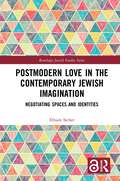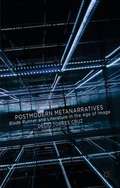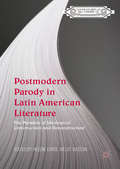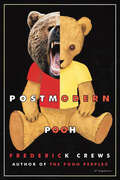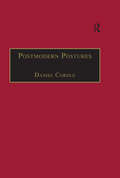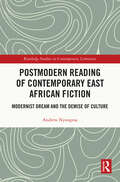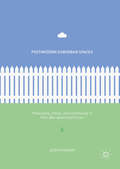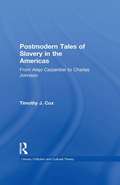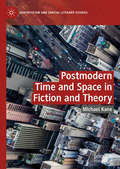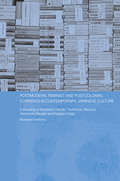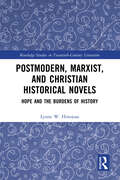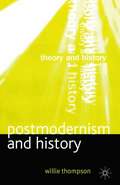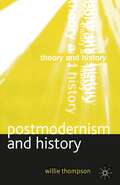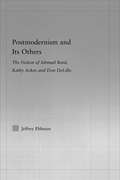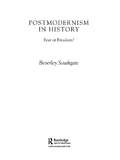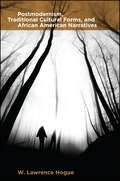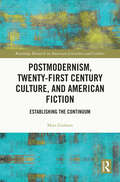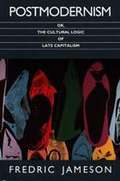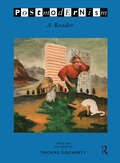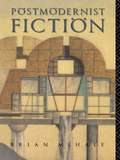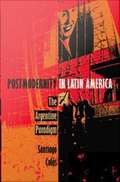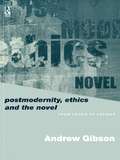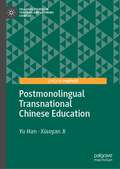- Table View
- List View
Postmodern Love in the Contemporary Jewish Imagination: Negotiating Spaces and Identities (Routledge Jewish Studies Series)
by Efraim SicherOffering a radical critique of contemporary Israeli and diaspora fiction by major writers of the generation after Amos Oz and Philip Roth, this book asks searching questions about identity formation in Jewish spaces in the twenty-first century and posits global, transnational identities instead of the bipolar Israel/diaspora model. The chapters put into conversation major authors such as Jonathan Safran Foer, Nicole Krauss, Michael Chabon, and Nathan Englander with their Israeli counterparts Zeruya Shalev, Eshkol Nevo, and Etgar Keret and shows that they share common themes and concerns. Read through a postmodern lens, their preoccupation with failed marriage and failed ideals brings to the fore the crises of home, nation, historical destiny, and collective memory in contemporary secular Jewish culture. At times provocative, at others iconoclastic, this innovative study must be read by anyone concerned with Jewish culture and identity today, whether scholars, students, or the general reader.
Postmodern Love in the Contemporary Jewish Imagination: Negotiating Spaces and Identities (Routledge Jewish Studies Series)
by Efraim SicherOffering a radical critique of contemporary Israeli and diaspora fiction by major writers of the generation after Amos Oz and Philip Roth, this book asks searching questions about identity formation in Jewish spaces in the twenty-first century and posits global, transnational identities instead of the bipolar Israel/diaspora model.The chapters put into conversation major authors such as Jonathan Safran Foer, Nicole Krauss, Michael Chabon, and Nathan Englander with their Israeli counterparts Zeruya Shalev, Eshkol Nevo, and Etgar Keret and shows that they share common themes and concerns. Read through a postmodern lens, their preoccupation with failed marriage and failed ideals brings to the fore the crises of home, nation, historical destiny, and collective memory in contemporary secular Jewish culture.At times provocative, at others iconoclastic, this innovative study must be read by anyone concerned with Jewish culture and identity today, whether scholars, students, or the general reader.The Open Access version of this book, available at http://www.taylorfrancis.com, has been made available under a Creative Commons Attribution-Non Commercial-No Derivatives (CC-BY-NC-ND) 4.0 license.
Postmodern Metanarratives: Blade Runner and Literature in the Age of Image
by Décio Torres CruzPostmodern Metanarratives investigates the relationship between cinema and literature by analyzing the film Blade Runner as a postmodern work that constitutes a landmark of cyberpunk narrative and establishes a link between tradition and the (post)modern.
Postmodern Parody in Latin American Literature: The Paradox Of Ideological Construction And Deconstruction (Literatures of the Americas)
by Helene Carol Weldt-BassonThis book examines postmodern parody in Latin American literature as the intersection between ideology construction and deconstruction. Parody’s chief task is to deconstruct and criticize the ideologies behind previous texts. During this process, new ideologies are inevitably constructed. However, postmodernism simultaneously recognizes the partiality of all ideologies and rejects their enthronement as absolute truth. This raises the question of how postmodern parody deals with the paradox inherent in its own existence on the threshold between ideology construction/deconstruction and the rejection of ideology. This book explores the relationship between parody and ideology, as well as this paradox of postmodern parody in works written by writers ranging from early twentieth-century poets to the most recent novel by the Nobel Prize-winning Mario Vargas Llosa. The analyses include such authors as Cristina Peri Rossi, Manuel Puig, Luisa Valenzuela, Enrique Sánchez, Roberto Bolaño, Claudia Piñeiro, Margarita Mateo Palmer, Boris Salazar and Rosario Ferré.
Postmodern Pooh
by Frederick Crews“A brilliant and savagely witty skewing of the combatants on all sides of the academic culture wars . . . pitch-perfect . . . incisive and hilarious.” —The Washington PostDecades ago, a slim parody of academic literary criticism called The Pooh Perplex became a surprise bestseller. Here, Frederick Crews has written an ingenious new satire in the same vein. Purporting to be the proceedings of a forum on Pooh convened at the Modern Language Association’s annual convention, Postmodern Pooh brilliantly parodies the academic fads and figures that hold sway in a new millennium, from poststructuralist Marxism to cultural studies.“Crews made me laugh until I wept.” —Philadelphia Inquirer“A fresh takedown of lit-crit theories.” —The New York Times“Sparkling wit and brilliant parodies.” —Los Angeles Times“Really good academic fun.” —The Boston Globe“Crews sinks his fangs into more recent movements, such as deconstructionism, new historicism, radical feminism, trauma studies, postcolonialism, and cybercriticism [and] magnanimously skewer[s] radicals and archconservatives alike . . . will keep anyone interested in literary scholarship in stitches.” —Library Journal
Postmodern Postures: Literature, Science and the Two Cultures Debate
by Daniel CordleIn 1996 the physicist Alan Sokal planted a hoax article in the journal Social Text, mimicking the social constructionist view of science popular in the humanities, and sparked into life the ’science wars’ which had been rumbling throughout the 1990s. Postmodern Postures puts this contemporary controversy into the context of earlier debates about the ’two cultures’, between F.R. Leavis and C.P. Snow, and Mathew Arnold and T.H. Huxley. Through an interrogation of interdisciplinary approaches to literature and science, and a discussion of the arguments surrounding postmodern culture, the book formulates a literary critical methodology for literature/science criticism, highlighting both the benefits and the limitations of attempts to link the two cultures. Three case studies, focused through the issues of knowledge, identity and time, put this methodology into practice, showing how ideas resonate through the culture between literature and science.
Postmodern Reading of Contemporary East African Fiction: Modernist Dream and the Demise of Culture (Routledge Studies in Contemporary Literature)
by Andrew NyongesaThis book likens writers’ incessant focus on racism, negative ethnicity, patriarchy and social stratification in societies to a naïve physician who prescribes analgesics to treat symptoms while the underlying cause of the disease seethes in the blood. In the same way, persons who consistently blame their reckless conduct and shabbiness miss the point if they do not transform the actual cause of the problem: the mind. While most literary scholars problematise gender disparities, racial and political othering, oppression, environment degradation, education matters, poor parenting and governance, they tend to disregard the root cause: modernism. This book finds a gap in this grey area to address the authentic cause of the symptoms that most literary writers and scholars treat. Pertinent modernist tenets such as bureaucracy, the nation state, systematisation and rationality, and dualism are at the heart of racism, corruption and other aforementioned symptoms. It is the contention of this study that postmodernism offers a comprehensive understanding of modernism to mitigate its effects on society.
Postmodern Suburban Spaces
by Joseph GeorgeThis book reevaluates fiction devoted to the postwar American suburb, examining the way these works imagine suburbia as a communal structure designed to advance a particular American identity. Postmodern Suburban Spaces surveys works by both canonical chroniclers of the middle class experience, such as Richard Yates and John Cheever, and those who reflect suburbia's demographic reality, including Gloria Naylor and Chang-rae Lee, to uncover a surprising reconfiguration of the suburban experience. Tracing major forms of suburban associations - racial divisions, property lines, the family, and ethnic fealty - these works depict a different mode of interaction than the stereotypical white picket fences. Joseph George draws from philosophers such as Emmanuel Levinas and Roberto Esposito to argue that these fictions assert a critical hospitality that frustrates the limited forms of association on which suburbia is based. This fiction, in turn, posits an ethical form of community that comes about when people share space together.
Postmodern Tales of Slavery in the Americas: From Alejo Carpentier to Charles Johnson (Literary Criticism and Cultural Theory)
by Timothy J. CoxFirst Published in 2001. Routledge is an imprint of Taylor & Francis, an informa company.
Postmodern Time and Space in Fiction and Theory (Geocriticism and Spatial Literary Studies)
by Michael KanePostmodern Time and Space in Fiction and Theory seeks to place the contemporary transformation of notions of space and time, often attributed to the technologies we use, in the context of the ongoing transformations of modernity. Bringing together examples of modern and contemporary fiction (from Defoe to DeLillo, Frankenstein to Finnegans Wake) and theoretical discussions of the modern and the post-modern, the author explores the legacy of modern transformations of space and time under five headings: “The Space of Nature”; “The Space of the City”; “Postmodern or Most Modern Time”; “The Time and Space of the Work of Art in the Age of Digital Reproduction”; and “Travel: from Modernity to…?”. These five essays re-examine the meanings of modernity and its aftermath in relation to the spaces and times of the natural, the urban and the media environment.
Postmodern, Feminist and Postcolonial Currents in Contemporary Japanese Culture: A Reading of Murakami Haruki, Yoshimoto Banana, Yoshimoto Takaaki and Karatani Kojin (Routledge/Asian Studies Association of Australia (ASAA) East Asian Series)
by Fuminobu MurakamiUsing the Euro-American theoretical framework of postmodernism, feminism and post-colonialism, this book analyses the fictional and critical work of four contemporary Japanese writers; Murakami Haruki, Yoshimoto Banana, Yoshimoto Takaaki and Karatani Kojin. In addition the author reconsiders this Euro-American theory by looking back on it from the perspective of Japanese literary work. Presenting outstanding analysis of Japanese intellectuals and writers who have received little attention in the West, the book also includes an extensive and comprehensive bibliography making it essential reading for those studying Japanese literature, Japanese studies and Japanese thinkers.
Postmodern, Marxist, and Christian Historical Novels: Hope and the Burdens of History (Routledge Studies in Twentieth-Century Literature)
by Lynne W. HinojosaPostmodern, Marxist, and Christian Historical Novels: Hope and the Burdens of History argues historical novels can help readers receive the burdens of history—meaning both the burdens of the past, present, and future and the burden of living in time—and develop a more robust conception of and concrete practice of hope. Since the 1960s, historical novels have been a dominant literary genre, but they have been influenced primarily not by Christian but by postmodern and marxist thinkers and writers. This book provides a theological and literary analysis of all three types of historical novels—postmodern, marxist, and Christian—and outlines what each school of thought can learn from each other regarding historical understanding and hope. Using Jürgen Moltmann’s theology of hope and Frank Kermode’s literary criticism as a theoretical basis, the book offers readings of novels by Julian Barnes, A.S. Byatt, Kazuo Ishiguro, Margaret Atwood, Michael Ondaatje, Ian McEwan, and Ursula LeGuin, among others, and ends with an extended analysis of Marilynne Robinson’s Gilead series.
Postmodernism and History
by Willie ThompsonIn this clear, jargon-free guide, Willie Thompson provides a concise introduction to postmodernist theory and its significant impact on the study of history. Although this is a hotly-debated topic, with much of the current literature being both polemical and inaccessible to the beginner, Thompson offers straightforward explanations of complex concepts and shows how the debates are relevant to students' own work. Postmodernism and History: - considers the origins of postmodernism in both the ideas of poststructuralist thinkers, particularly Michel Foucault, and the political and cultural developments of the late 20th century - explores themes such as the treatment of historical evidence, problems of historical representation, feminist history, ethical judgements on past events, and the validity of metanarrative or long-term historical explanation - discusses critically the work of a number of current and recent practicing historians - including Joan Scott, Roy Porter, Patrick Joyce and James Vernon - who have used postmodernist ideas in their writing - enquires how far postmodern thought has been absorbed into mainstream historiography
Postmodernism and History (Theory and History)
by W. ThompsonIn this clear, jargon-free guide, Willie Thompson provides a concise introduction to postmodernist theory and its significant impact on the study of history. Although this is a hotly-debated topic, with much of the current literature being both polemical and inaccessible to the beginner, Thompson offers straightforward explanations of complex concepts and shows how the debates are relevant to students' own work.Postmodernism and History:- considers the origins of postmodernism in both the ideas of poststructuralist thinkers, particularly Michel Foucault, and the political and cultural developments of the late 20th century- explores themes such as the treatment of historical evidence, problems of historical representation, feminist history, ethical judgements on past events, and the validity of metanarrative or long-term historical explanation- discusses critically the work of a number of current and recent practicing historians - including Joan Scott, Roy Porter, Patrick Joyce and James Vernon - who have used postmodernist ideas in their writing- enquires how far postmodern thought has been absorbed into mainstream historiography
Postmodernism and Its Others: The Fiction of Ishmael Reed, Kathy Acker, and Don DeLillo (Literary Criticism and Cultural Theory)
by Jeffrey EbbesonFirst published in 2006. Routledge is an imprint of Taylor & Francis, an informa company.
Postmodernism in History: Fear or Freedom?
by Beverley SouthgateThis original and thought-provoking study looks at the context of postmodernist thought in general cultural terms as well as in relation to history. Postmodernism in History traces philosophical precursors of postmodernism and identifies the roots of current concerns. Beverley Southgate describes the core constituents of postmodernism and provides a lucid and profound analysis of the current state of the debate. His main concern is to counter 'pomophobia' and to assert a positive future for historical study in a postmodern world.Postmodernism in History is a valuable guide to some of the most complex questions in historical theory for students and teachers alike.
Postmodernism, Traditional Cultural Forms, and African American Narratives
by W. Lawrence HogueThis book explores how African American social and political movements, African American studies, independent scholars, and traditional cultural forms revisit and challenge the representation of the African American as deviant other. After surveying African American history and cultural politics, W. Lawrence Hogue provides original and insightful readings of six experimental/postmodern African American texts: John Edgar Wideman's Philadelphia Fire; Percival Everett's Erasure; Toni Morrison's Jazz; Bonnie Greer's Hanging by Her Teeth; Clarence Major's Reflex and Bone Structure; and Xam Wilson Cartiér's Muse-Echo Blues. Using traditional cultural and western forms, including the blues, jazz, voodoo, virtuality, radical democracy, Jungian/African American Collective Unconscious, Yoruba gods, black folk culture, and black working class culture, Hogue reveals that these authors uncover spaces with different definitions of life that still retain a wildness and have not been completely mapped out and trademarked by normative American culture. Redefining the African American novel and the African American outside the logic, rules, and values of western binary reason, these writers leave open the possibility of psychic liberation of African Americans in the West.
Postmodernism, Twenty-First Century Culture, and American Fiction: Establishing the Continuum (Routledge Research in American Literature and Culture)
by Matt GrahamPostmodernism’s ‘end’ is a complex and contentious topic. Yet, one overarching consensus emerges: the postmodern has been surpassed. This book poses a thought experiment challenging this position – what if postmodernism persists within the twenty-first century?Rather than designate a new epoch or coherent movement, this book interrogates the fragmented, contradictory, and counterintuitive endurance of postmodern aesthetics within post-Cold War America. An alternative use of postmodern aesthetics becomes possible when they are decoupled from their twentieth-century historical location. Collectively, these repetitions posit a postmodern continuum, contrasting the widely called-for succession of postmodernism via this decoupling. When postmodern aesthetics are no longer unconsciously repeated within their cultural moment, this emergent shift within a period ‘after’ postmodernism presents an alternative historical positioning and use. After their cultural vanguard, postmodern aesthetics become a confrontation of the chaotic realism of an inescapable post-Cold War capitalism, tapping into this cultural zeitgeist through literature.
Postmodernism, or, The Cultural Logic of Late Capitalism
by Fredric JamesonNow in paperback, Fredric Jameson's most wide-ranging work seeks to crystallize a definition of "postmodernism." Jameson's inquiry looks at the postmodern across a wide landscape, from "high" art to "low" from market ideology to architecture, from painting to "punk" film, from video art to literature.
Postmodernism: A Reader
by Thomas DochertyThis reader provides a selection of articles and essays by leading figures in the postmodernism debate.
Postmodernism: A Reader
by Thomas DochertyThis reader provides a selection of articles and essays by leading figures in the postmodernism debate.
Postmodernist Fiction
by Brian McHaleIn this trenchant and lively study Brian McHale undertakes to construct a version of postmodernist fiction which encompasses forms as wide-ranging as North American metafiction, Latin American magic realism, the French New New Novel, concrete prose and science fiction. Considering a variety of theoretical approaches including those of Ingarden, Eco, Dolezel, Pavel, and Hrushovski, McHale shows that the common denominator is postmodernist fiction's ability to thrust its own ontological status into the foreground and to raise questions about the world (or worlds) in which we live. Exploiting various theoretical approaches to literary ontology - those of Ingarden, Eco, Dolezel, Pavel, Hrushovski and others - and ranging widely over contemporary world literature, McHale assembles a comprehensive repertoire of postmodernist fiction's strategies of world-making and -unmaking.
Postmodernity in Latin America: The Argentine Paradigm
by Santiago ColásPostmodernity in Latin America contests the prevailing understanding of the relationship between postmodernity and Latin America by focusing on recent developments in Latin American, and particularly Argentine, political and literary culture. While European and North American theorists of postmodernity generally view Latin American fiction without regard for its political and cultural context, Latin Americanists often either uncritically apply the concept of postmodernity to Latin American literature and society or reject it in an equally uncritical fashion. The result has been both a limited understanding of the literature and an impoverished notion of postmodernity. Santiago Cols challenges both of these approaches and corrects their consequent distortions by locating Argentine postmodernity in the cultural dynamics of resistance as it operates within and against local expressions of late capitalism. Focusing on literature, Cols uses Julio Cortzar's Hopscotch to characterize modernity for Latin America as a whole, Manuel Puig's Kiss of the Spider Woman to identify the transition to a more localized postmodernity, and Ricardo Piglia's Artificial Respiration to exemplify the cultural coordinates of postmodernity in Argentina. Informed by the cycle of political transformation beginning with the Cuban Revolution, including its effects on Peronism, to the period of dictatorship, and finally to redemocratization, Cols's examination of this literary progression leads to the reconstruction of three significant moments in the history of Argentina. His analysis provokes both a revised understanding of that history and the recognition that multiple meanings of postmodernity must be understood in ways that incorporate the complexity of regional differences. Offering a new voice in the debate over postmodernity, one that challenges that debate's leading thinkers, Postmodernity in Latin America will be of particular interest to students of Latin American literature and to scholars in all disciplines concerned with theories of the postmodern.
Postmodernity, Ethics and the Novel: From Leavis to Levinas
by Andrew GibsonIn Postmodernity, Ethics and the Novel Andrew Gibson sets out to demonstrate that postmodern theory has actually made possible an ethical discourse around fiction. Each chapter elaborates and discusses a particular aspect of Levinas' thought and raises questions for that thought and its bearing on the novel. It also contains detailed analyses of particular texts. Part of the book's originality is its concentration on a range of modernist and postmodern novels which have seldom if ever served as the basis for a larger ethical theory of fiction. Postmodernity, Ethics and the Novel discusses among others the writings of Joseph Conrad, Henry James, Jane Austen, Samuel Beckett, Marcel Proust and Salman Rushdie.
Postmonolingual Transnational Chinese Education (Palgrave Studies in Teaching and Learning Chinese)
by Yu Han Xiaoyan JiThis book examines Transnational Chinese Language Education (TCLE) in the Australian context. Taking a post-monolingual perspective, the authors examine Chinese teachers’ monolingual and multilingual practices and mindsets in their educational practices. They find that a Chinese-centric monolingual mindset dominates the Chinese teachers, while a multilingual mindset permeates in their classroom teaching, creating an unconscious tension between the two perspectives. The book proposes that it is the responsibility of teacher educators to train future Chinese teachers with an awareness of this issue, as well as suitable strategies to overcome it and be efficient language teachers. This book will be of interest to applied linguists, pre-service and in-service language teachers, as well as students and scholars of Teaching Chinese to Speakers of Other Languages (TCSOL).
